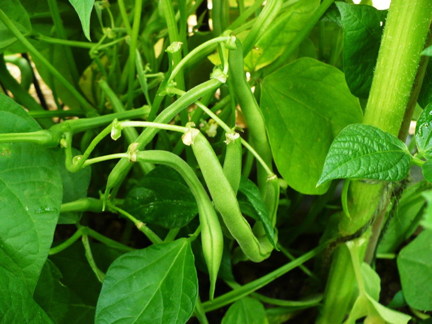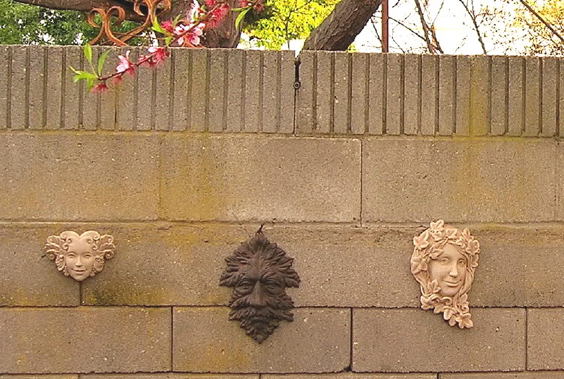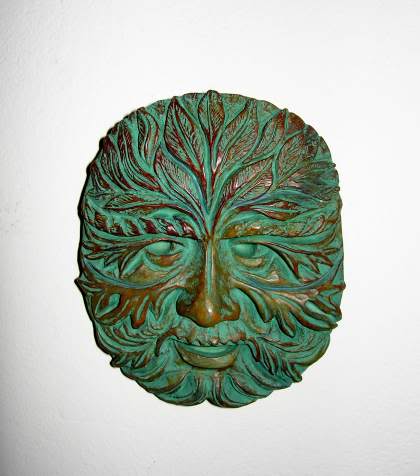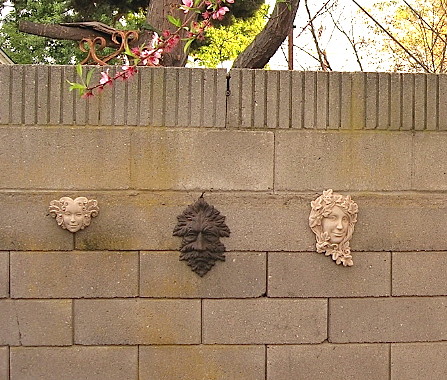Thu 28 Jul 2016
Green Man, Part II: Just so my father planted beans
Posted by PJ under 4th avenue, fathers, folklore, gardens, green man, portraits, reminiscence, venice
No Comments

what mind does not: just so my
father planted beans.
As I’ve said elsewhere, I’ve long been fascinated by Green Men. I’ve only figured out recently that this may be because my own father was a Green Man.
It’s funny the things that set you to remembering.
The other day when I was in the cafeteria at work, I had a semi-meaningless conversation about pickles. That conversation sparked a memory so keen I had to write it down immediately.
My father planted a vast vegetable garden every year in the immense back yard of our rental property in Venice. He had no tolerance for flowers and, like as not, he’d pull them up if he needed more space for edibles.
Still, the garden he planted was a work of art: lovingly conditioned soil, weeks in churning and amending, row upon neat little row of carrot, onion, parsnip, red radish, bell pepper. Beyond those rows, beautifully rounded little mounds held cucumber, ringed round with carefully dug irrigation channels. The leaves of the cucumbers were hairy and pointy-edged, the stems thick and fuzzy, bobbing green in the summer breeze, yellow in the fall. The tomato plants on the other side of the cucumbers always started in orderly, well-staked rows, but by fall they danced in an entwined frenzy. Along the back fence, wire with a spiky top, banana squash climbed. Sometimes corn grew beside it.
Between the back fence crops and the tomatoes ran an arbor for string beans—a porous frame of wood and chicken wire during the fallow months, ten feet tall and perhaps twenty feet long. In the summer months, though, it became a green tunnel as the beans climbed up the sides and over the top. The sun shone liquid green through the leaves, and even in the hottest summer the earth beneath—near-black with fecundity and never dried completely during the growing season—felt cool to my bare feet. That soil made all things seem possible. I would wander up and down it daydreaming, getting a buzz from the green smell of the beans.
If ever there was a place my soul felt repose, it was there. I suspect my father felt the same way. He preferred spending time in his garden, in the green bean tunnel, to time with my mother and I. Perhaps that wasn’t so, just my perception, but it felt to me as if he couldn’t find a way to bridge the gap between that shining green light and the warmth of the hearth. After the day’s gardening, he seemed empty and at a loss. The demons that tormented him grew thicker in the air.
He’d nearly reached retirement age by the time I was born. When I was small, I adored helping him in the garden, just being with him. When I hit puberty, our worldviews had grown too divergent. At least two generations separated us, and only in the green space had we any hope of reaching across the decades. Even in puberty, the garden and that cool green tunnel seemed like a magic place. When the churning of my brain and growing body got to be too much, I’d return to it and wander up and down. I had this feeling, way down deep, that if I could just make it to the end of that tunnel, the true end, not the one I saw with my eyes, I’d be changed. Or maybe all my wishes would be granted. I never made it that far.
I’d see Dad in the tunnel, slowly walking up and down, lifting the bean pods tenderly in his hands to check their progress, seeing if they were ready for the ritual of the canning process. Mom and I were not allowed near the kitchen when the canning sacrament was underway. Mornings in late summer and early fall, I’d wake to the smell of green beans cooking, ready for the mason jars; or dill, alum, and vinegar boiling to turn fresh-picked cucumbers into the best pickles in the world. An astringent smell, but to me it held the promise of something delicious in the heart of winter.
I still see my father in that garden, and wonder what he found when he took the final walk to the end of that shining green tunnel. I wonder if his wishes came true?
There’s a quote from Vincent Van Gogh that reminds me of my father: “I am a burning hearth. People see the smoke, but no one comes to warm themselves.”
But there’s another quote from Albert Camus I like much better, and hope applies to Dad equally well: “In the depth of winter, I finally learned that within me there lay an invincible summer.”



